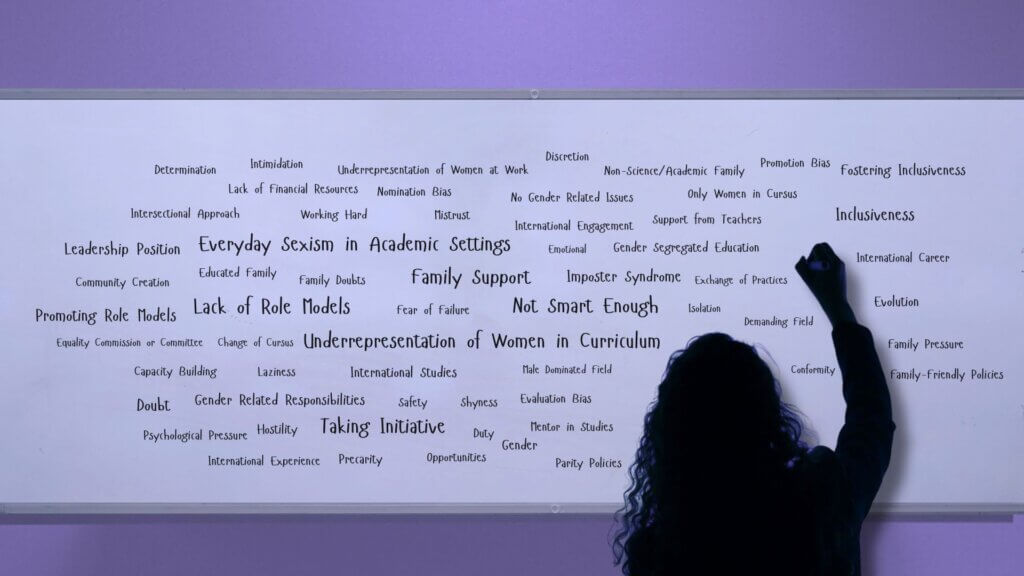
This article is part of the series “Women scientists around the world: strategies for gender equality” exploring the drivers and barriers to gender representation in scientific organizations. It draws on a qualitative pilot study conducted by the International Science Council (ISC) with the Standing Committee for Gender Equality in Science (SCGES), based on interviews with women scientists from various disciplines and geographic regions. The series is published simultaneously on the websites of ISC and SCGES.
Dr. Moraes developed an interest in science through her father—a native of the Amazon—who sensitized her to the beauty of nature and the tropical forest from her childhood. She remembers going for holidays in the mountain rainforests, where her father would explain nature’s cycles, how to cultivate plants, and how to harvest fruits. These childhood experiences have had a lasting impact on Mónica, and she believes she naturally pivoted towards biology and the Amazon nature as a result.
Early on, Dr. Moraes had to rely on international opportunities to pursue her diploma and career. Following political and military turmoil in the country, all universities in Bolivia had been shut down, prompting Mónica to pursue her biology studies in Spain for two years. Fortunately, the credits obtained during this hiatus were later validated by the Bolivian education system, and she was able to resume her studies in her home country.
While she was studying, a group of Danish researchers had been based in Ecuador for more than 20 years, studying the tropical forest. One of them, Dr. Henrik Balslev, became Mónica’s mentor and invited her to join their research when he received a grant from the International Union for Conservation of Nature to assess the state of conservation of palm trees of Bolivia by means of a brief field trip in the Yungas region.
After that first research experience, she received a phone call from Dr. Balslev saying, “I’ve got a scholarship for you. Can you travel to Denmark in the next two weeks?” She pursued her Master’s (1989) and PhD (1996) degrees at the University of Aarhus in Denmark.
Mónica’s and other Latin American colleagues dream as a researchers came true shortly after in 2005. This research team of four South American and European countries partners was awarded a large grant of 1.5 million euros over five years from the European Union to conduct fieldworks throughout Latin America’s forests. Several young researchers also carried out work for undergraduate, MSc and PhD degrees.
During our interview, Mónica reported that she did not experience any problems during her studies or her university career relating to gender. But things became challenging in this respect when she first joined the Science Academy. In 2000, her name had been nominated by Dr, Armando Cardozo to join as one of the new fellows, but years passed, and her nominator unfortunately passed away before she was finally admitted in 2008. “This was a heartbreaking moment for me, as he was so willing and looking forward to having me join.”
Before her, only one woman had ever been nominated as a full member of the Bolivian Academy, and after finally being admitted following a long wait, Mónica initially kept low profile. “Most science academies are akin to patriarchal structures”—everything works with men; men are everywhere. This culture and history have an impact on the institution.” Mónica spoke of a “culture of silence” that befalls women allowed to join such prestigious institutions. “They do not want to make waves; on the other hand, it seems that men are not aware of this issue. For them, there is no problem.”
Dr. Moraes gradually started to come out of her shell. She described herself as resilient and determined and was set to change things, slowly breaking through that culture of silence. Five years after joining the academy, she proposed establishing a prize dedicated to women scientists, which was approved. “After that, all I did was scale up things, request more and more, and take on more and more responsibilities.” She felt more included at the institutional level. She was designated by the Academy president to join the Women for Science program of the InterAmerican Network of Academies of Sciences (IANAS), of which she became the focal point. Talking with other women scientists from other academies across the entire American continent was crucial. “I learned so many things and was impressed by how many gender issues were promoted and resolved in the history of other academies. Following their examples, I proposed that the Bolivian academy set up its own gender commission.”
Hearing from other women working to promote representation and equality in their own institutions comforted Mónica to do the same. “I became very committed. If we were building out a new team, a new commission, I was always putting forward other women. ‘Why not involve Celeste? Why not Ana for this role?’ I wanted to have women involved in all commissions and in all activities of the academy.”
Dr. Moraes was elected President of the Academy in 2021, and with that, she tackled her biggest project yet—the revision of the academy’s statutes. She aimed to improve the nomination procedure and modernizing procedures like other academies of science, specifically moving the selection of new members from a plenary vote to exclusively an evaluation by the committee of admissions. “It took a lot of effort,” recalled Mónica, “many, many meetings over a year to review documents.”
At the time, to select new members, the committee would give a list of pre-selected candidates based on evaluation criteria. “This was fine,” says Mónica, “but once the list was made, new members had to be voted for in public during plenary meetings. It was so difficult to have a good idea of who each candidate was and to have their full contributions shared. We were only reading a short summary before the vote.”
She then decided to eliminate the plenary vote selection and have the committee of admissions rely solely on their own objective evaluation of each candidate. Candidates now have a clear view of the process and an objective list of criteria they must meet to be nominated. They no longer must submit to the subjective vote of other members. “You do not have to know people; you do not have to be recommended. Now it is based on career criteria, like publications and positions.”
Mónica feels this process has encouraged more scientists to apply. “In a single year, in 2022, we added 6 new members, which is a record!” Dr. Moraes estimated that women’s representation within the academy has grown by 30%. She also noted younger scientists joining, with the youngest being nominated at 48 years old.
But despite this progress, she still sees a lack of confidence in her female peers. “I have tried to convince to six new female scientists to apply to the academy, but only one has replied.” Mónica believes one of the reasons is that some think they do not have enough publications yet. “Maybe I could show them the admission file of a colleague who received a 100% score and got nominated; maybe then they will think that they can do it too.”
Things are gradually changing within the Bolivian science academy, all thanks to the perseverance and determination of a few women and regional collaboration with women pursuing the same goal. The backing of the plenary sessions and the consensus support by all members of the Academy has been key to its management.
At the time of the interview, Mónica’s term was soon coming to an end, but she still had a good idea of what needed to be done. “I think we need a stronger gender commission at the academy, with enough resources to organize meetings with women scientists around the country—perhaps virtually. I’d love to also see a space for students, some mentoring to guide them through potential challenges.”
She felt that not running for another term as President might free up some time to drive progress in the commission and implement some of her gender advocacy in her job at the university. “I will probably not set up a gender commission at the university, but I think for me, this advocacy is a daily basis. I can interact with our students, create spaces, and give advice on how to deal with gender equality issues.”
Dr. Mónica Moraes is a biologist specialized in palm trees, is a full-time professor, and researcher at the Herbario Nacional and Instituto de Ecología of the Universidad Mayor de San Andrés in Bolivia. From 2021 until mid-2024, she was the first woman President of the Bolivian Academy of Sciences.
 blog
blog
 blog
blog
Disclaimer
The information, opinions and recommendations presented in our guest blogs are those of the individual contributors, and do not necessarily reflect the values and beliefs of the International Science Council